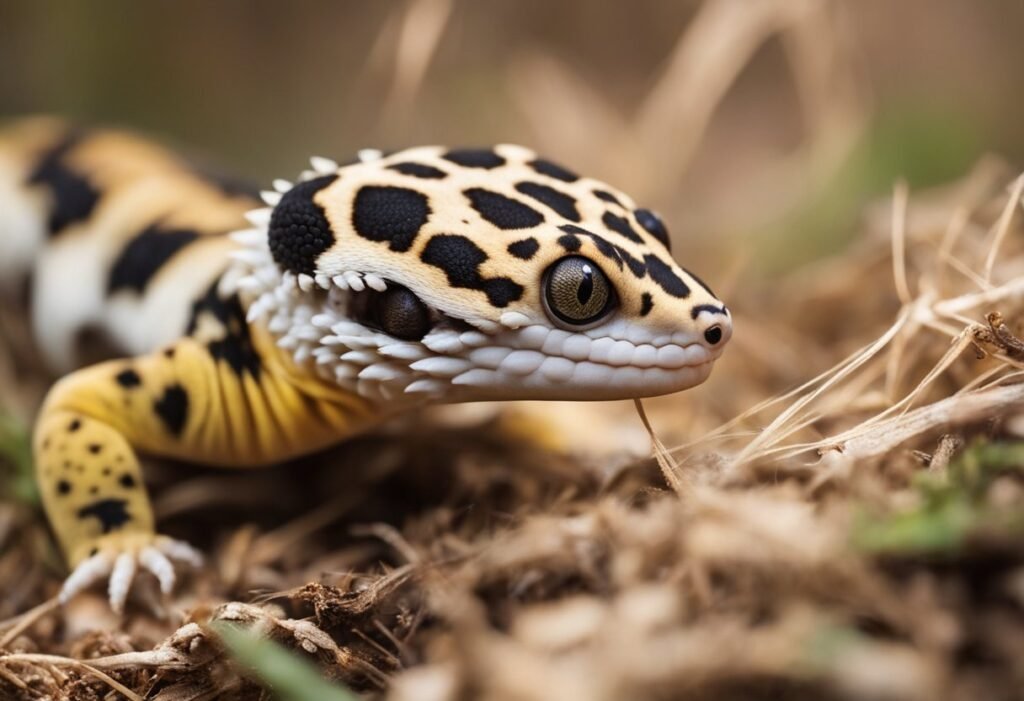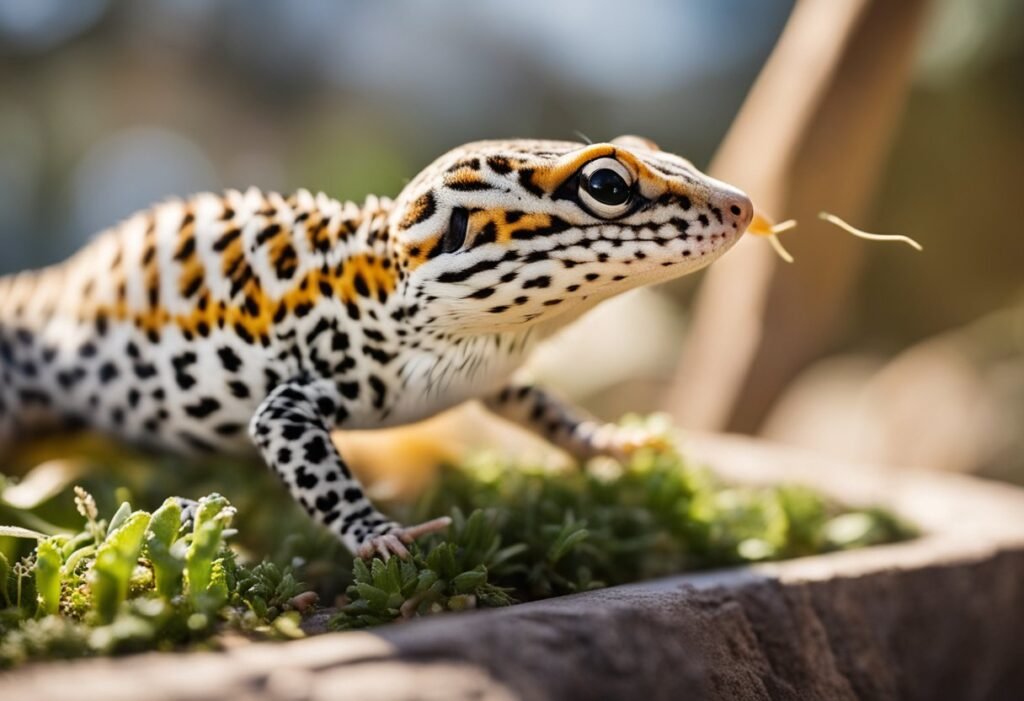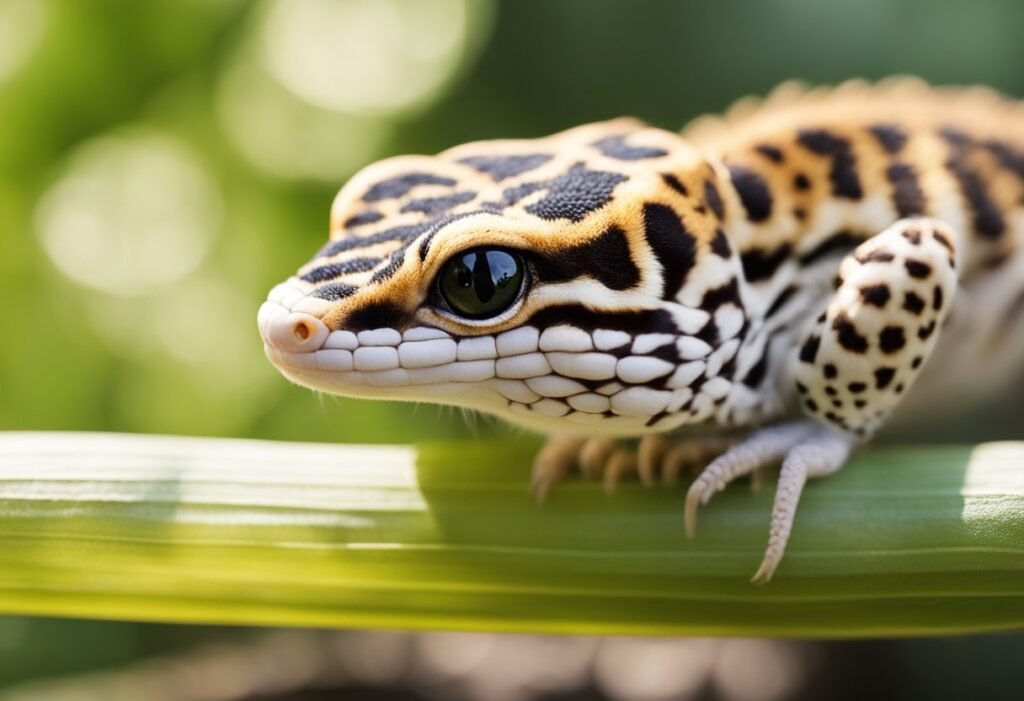Leopard geckos are fascinating creatures that are often kept as pets. They are known for their unique appearance and easy-to-care-for nature. However, when it comes to feeding them, there are many questions that arise, including whether they can eat bugs from outside. In this article, we will explore this topic to help you better understand what is safe and healthy for your leopard gecko.
Firstly, it is important to note that not all bugs are safe for leopard geckos to consume. In fact, some bugs can be toxic and even deadly to them. Therefore, it is crucial to be cautious when feeding your leopard gecko and only offer them bugs that are safe for them to eat. Additionally, it is important to ensure that the bugs are free from any harmful chemicals or pesticides.
So, can leopard geckos eat bugs from outside? The answer is yes, but with caution. It is important to properly identify the bugs and ensure that they are safe for your leopard gecko to consume. In the following paragraphs, we will explore some of the bugs that are safe for leopard geckos and provide tips on how to safely collect and feed them.
Dietary Basics of Leopard Geckos

Leopard geckos are insectivores, which means they eat insects. It is important to provide them with a balanced and varied diet to ensure they get all the nutrients they need to stay healthy.
Natural Prey for Leopard Geckos
In the wild, leopard geckos feed on a variety of insects, including crickets, mealworms, waxworms, and roaches. They also eat small lizards and spiders. It is important to note that leopard geckos should not be fed wild-caught insects as they may contain parasites or pesticides.
Nutritional Requirements
Leopard geckos require a diet that is high in protein and low in fat. They also need a source of calcium to maintain healthy bones. Here are some important nutrients to consider when feeding your leopard gecko:
- Protein: Crickets, mealworms, and roaches are good sources of protein for leopard geckos. Waxworms should be fed sparingly as they are high in fat.
- Calcium: Leopard geckos require calcium for healthy bones. You can provide calcium by dusting their food with a calcium supplement or by offering a calcium-rich food, such as calcium-fortified crickets.
- Vitamins and minerals: Leopard geckos also require vitamins and minerals, such as vitamin D3 and phosphorus. These can be provided through a balanced diet and UVB lighting.
It is important to offer a variety of insects to ensure your leopard gecko gets all the nutrients they need. Avoid feeding them insects that are too large, as this can cause digestive problems. Also, make sure to provide fresh water at all times.
Risks of Feeding Wild-Caught Insects

Feeding leopard geckos with insects caught from outside may seem like a natural and cost-effective way to provide them with food. However, there are several risks associated with this practice that should be considered before doing so.
Parasites and Pesticides
One of the main concerns with feeding wild-caught insects to leopard geckos is the risk of introducing parasites into their diet. Insects that are caught from outside may carry various types of parasites such as mites, ticks, and worms. These parasites can cause health problems in leopard geckos, including weight loss, lethargy, and even death.
In addition to parasites, wild-caught insects may also contain pesticides. Pesticides are chemicals that are used to kill insects and other pests. If leopard geckos consume insects that have been exposed to pesticides, they may suffer from toxic effects. Symptoms of pesticide poisoning in leopard geckos include vomiting, diarrhea, and seizures.
Potential Toxins
Another risk associated with feeding wild-caught insects to leopard geckos is the potential for toxins. Insects that are caught from outside may have been exposed to various toxins such as heavy metals, herbicides, and pollutants. If leopard geckos consume insects that have been exposed to these toxins, they may suffer from various health problems such as liver damage, kidney damage, and neurological disorders.
To minimize the risks associated with feeding wild-caught insects to leopard geckos, it is recommended to only feed them insects that have been specifically bred for reptile consumption. These insects are raised in a controlled environment and are free from parasites, pesticides, and toxins. Additionally, it is important to thoroughly wash any fruits or vegetables that are fed to leopard geckos to remove any traces of pesticides or other toxins.
Safe Insect Feeding Practices

When feeding leopard geckos, it is important to ensure that they are consuming safe and nutritious insects. While it may be tempting to collect insects from outside, there are risks associated with doing so. In this section, we will discuss safe insect feeding practices for leopard geckos.
Quarantine of Wild Insects
Before feeding any wild insects to leopard geckos, it is important to quarantine them. This is because wild insects may carry parasites or diseases that could be harmful to your gecko. Quarantining involves keeping the insects in a separate container for a period of time to observe them for any signs of illness or disease.
We recommend quarantining wild insects for at least a week before feeding them to your gecko. During this time, observe the insects for any signs of illness or disease, such as lethargy, loss of appetite, or abnormal behavior. If any of these signs are present, do not feed the insects to your gecko.
Gut-Loading and Dusting
In addition to ensuring that the insects are safe to eat, it is also important to ensure that they are nutritious. This can be achieved through gut-loading and dusting.
Gut-loading involves feeding the insects a nutritious diet before feeding them to your gecko. This ensures that the insects are packed with nutrients that your gecko needs. Some good gut-loading foods include carrots, sweet potatoes, and leafy greens.
Dusting involves coating the insects with a calcium supplement powder before feeding them to your gecko. This helps to ensure that your gecko is getting enough calcium, which is important for healthy bones and overall health.
In conclusion, it is important to follow safe insect feeding practices when feeding leopard geckos. This includes quarantining wild insects and ensuring that they are gut-loaded and dusted before feeding them to your gecko. By following these practices, you can help to ensure that your gecko is healthy and happy.
Alternative Food Sources
When it comes to feeding leopard geckos, it’s important to ensure that they are getting the right nutrients and that their food is safe for consumption. While it may be tempting to feed them bugs from outside, it’s important to note that these insects may carry harmful parasites or pesticides that can harm your pet. Here are some alternative food sources that you can consider:
Commercially Bred Feeders
One of the safest and most convenient options for feeding your leopard gecko is commercially bred feeders. These insects are bred specifically for consumption by reptiles and are usually free from parasites and pesticides. Some common commercially bred feeders include crickets, mealworms, and dubia roaches.
When purchasing commercially bred feeders, it’s important to ensure that they are from a reputable source and that they are properly gut-loaded and dusted with calcium powder before feeding them to your leopard gecko.
Cultivating Safe Prey
Another option for feeding your leopard gecko is to cultivate your own prey. This can be a cost-effective and sustainable way to provide your pet with a variety of nutritious insects. Some safe insects to cultivate include dubia roaches, mealworms, and superworms.
When cultivating your own prey, it’s important to ensure that they are fed a nutritious diet and that their enclosure is kept clean to prevent the growth of harmful bacteria or parasites. Additionally, it’s important to avoid using pesticides or other harmful chemicals in the cultivation process.
Overall, while it may be tempting to feed your leopard gecko bugs from outside, it’s important to prioritize their health and safety by considering alternative food sources such as commercially bred feeders or cultivated prey.
Monitoring Your Leopard Gecko’s Health

As responsible pet owners, it is important to monitor our leopard gecko’s health regularly. In this section, we will discuss some signs of nutritional deficiencies and behavioral indicators of illness that we should be aware of.
Signs of Nutritional Deficiencies
Leopard geckos require a balanced diet to stay healthy. Feeding them bugs from outside may introduce harmful bacteria and parasites, leading to nutritional deficiencies. Here are some signs of nutritional deficiencies to look out for:
- Weight loss
- Weakness
- Lethargy
- Dehydration
- Stunted growth
- Metabolic bone disease
If we notice any of these signs, we should consult a veterinarian who specializes in reptiles immediately.
Behavioral Indicators of Illness
Apart from physical signs, leopard geckos also exhibit behavioral changes when they are unwell. Here are some common behavioral indicators of illness:
- Lack of appetite
- Refusal to eat
- Hiding
- Restlessness
- Aggression
- Abnormal movements
If we observe any of these behaviors, we should monitor our leopard gecko closely and seek veterinary care if necessary.
In conclusion, feeding leopard geckos bugs from outside may pose a risk to their health. By monitoring their health regularly and being aware of signs of nutritional deficiencies and behavioral indicators of illness, we can ensure that our pets stay healthy and happy.
Frequently Asked Questions
Is it safe for leopard geckos to consume wild-caught insects?
It is generally not recommended to feed wild-caught insects to leopard geckos. Wild insects may carry parasites, pesticides, or other harmful substances that can be detrimental to your gecko’s health. It is best to stick to commercially raised insects that are specifically bred for feeding reptiles.
What alternative insects can I feed my leopard gecko if not crickets?
Leopard geckos can eat a variety of insects, including mealworms, waxworms, superworms, and dubia roaches. It is important to ensure that the insects are appropriately sized for your gecko and that they are gut-loaded (fed nutritious food prior to feeding to your gecko) to provide optimal nutrition.
Are there any vegetables appropriate for a leopard gecko’s diet?
Leopard geckos are primarily insectivores and do not require vegetables in their diet. However, some geckos may enjoy occasional bites of leafy greens such as kale or collard greens. It is important to note that vegetables should not make up a significant portion of your gecko’s diet.
Can leopard geckos eat commercially prepared diets like Pangea?
While some commercially prepared diets may be marketed towards leopard geckos, it is important to note that these diets should not be the sole source of nutrition for your gecko. Insects should still make up the majority of their diet, and these diets should be used as a supplement or occasional treat.
What types of worms are nutritious for leopard geckos to eat?
Leopard geckos can eat a variety of worms, including mealworms, waxworms, and superworms. It is important to ensure that the worms are appropriately sized for your gecko and that they are gut-loaded to provide optimal nutrition.
Are house spiders a suitable food source for leopard geckos?
No, it is not recommended to feed house spiders to leopard geckos. House spiders may carry harmful toxins that can be dangerous to your gecko’s health. It is best to stick to commercially raised insects that are specifically bred for feeding reptiles.





